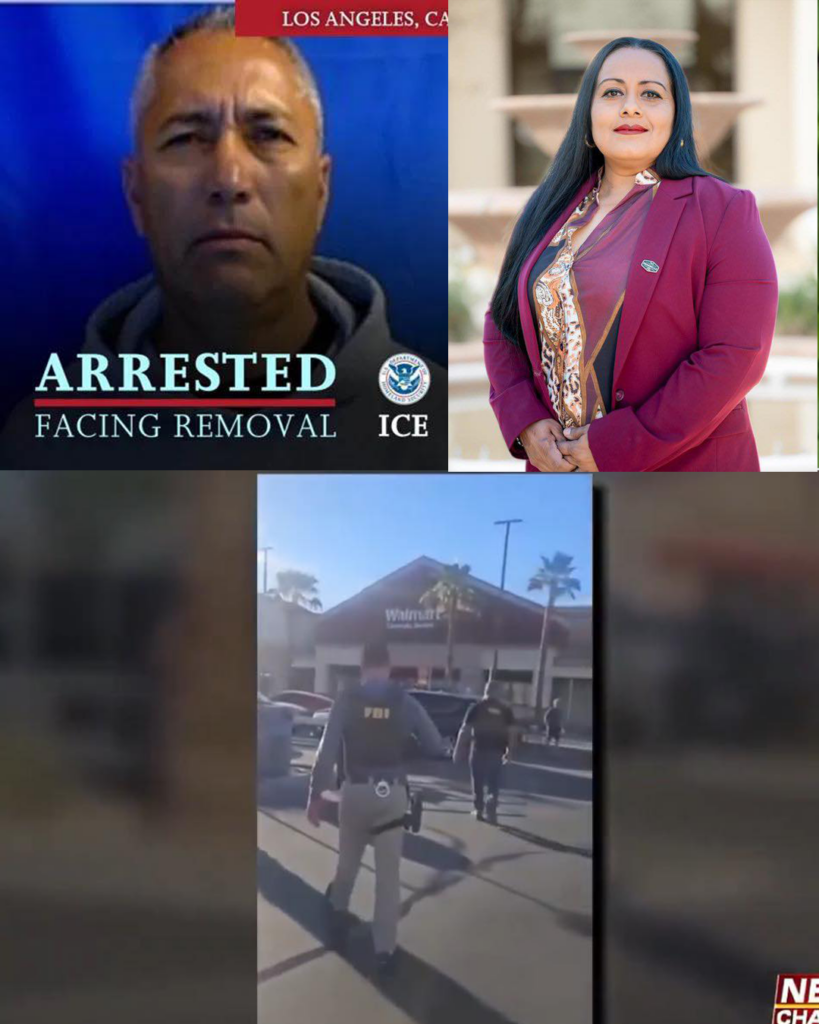On a tense Monday afternoon, February 24, 2025, the quiet parking lot of a Walmart in Coachella, California, became the stage for a dramatic federal operation. Yadira Perez, a respected member of the Coachella City Council, stood by in distress as U.S. Immigration and Customs Enforcement (ICE) agents, assisted by the FBI, arrested her husband, Isidro Jimenez. The incident, captured on video and widely shared across platforms like X, has thrust Perez and Jimenez into the national spotlight, raising questions about immigration enforcement, personal accountability, and the intersection of public service and private life.

The Arrest That Shook Coachella
Isidro Jimenez, a 51-year-old Mexican national, was detained as part of a targeted ICE operation aimed at apprehending undocumented immigrants with criminal histories. The arrest wasn’t a random sweep but the result of a meticulous review by ICE’s National Criminal Analysis and Targeting Center, which flagged Jimenez for his extensive rap sheet and repeated illegal reentries into the United States. According to federal records, Jimenez was first deported in 1995 after a conviction for possessing methamphetamine with intent to sell—a serious drug dealing charge in Riverside County. Undeterred, he returned to the U.S. illegally, building a life that included marriage to Perez and a string of additional convictions.
Jimenez’s criminal history is not a footnote but a central element of this story. Over the decades, he racked up convictions for inflicting corporal injury on a spouse in 1998, driving under the influence (DUI) in 1996 and 2007, and, most recently, assault with a deadly weapon in 2023. Each offense compounded his legal troubles, culminating in this latest ICE arrest for illegal reentry—a federal felony under 8 USC 1326 that carries a potential two-year prison sentence, or up to ten years given his prior felonies. Released on bond the following day, Jimenez awaits an April hearing, though federal prosecutors are pushing to reconsider his release, citing his flight risk and threat to public safety.
Yadira Perez: From Sheriff’s Deputy to Councilmember in Crisis
Yadira Perez, 44, has been a fixture in Coachella’s public life. Elected to the City Council in November 2024, she brought a fresh perspective to a city known for its vibrant culture and sanctuary policies. But her resume extends beyond politics—for two decades, she served as a deputy with the Riverside County Sheriff’s Office, a role that demanded adherence to the law and public trust. That chapter closed abruptly this week when Perez resigned from the sheriff’s department following her husband’s arrest, a decision confirmed by Sheriff Chad Bianco amid an ongoing investigation into the incident’s timeline.
Perez’s emotional response to the arrest, recorded as federal agents surrounded Jimenez, struck a chord online. “My family was just separated. They have taken my kids’ father,” she cried, framing the event as a personal tragedy. Yet, her narrative has drawn scrutiny. While she acknowledged Jimenez’s past imperfections to local media, saying, “Whatever he did, he paid for it,” the full scope of his convictions—spanning drug trafficking, domestic violence, and violent assault—paints a more complex picture. Her resignation from the sheriff’s office suggests an awareness of the conflict between her public roles and her husband’s legal status, a tension amplified by Coachella’s sanctuary city designation, which limits local cooperation with federal immigration efforts.
The Broader Context: Immigration Enforcement in 2025
Jimenez’s arrest comes at a pivotal moment. As of March 05, 2025, the Trump administration has intensified its focus on deporting undocumented immigrants with criminal records, a policy championed by newly appointed Secretary of Homeland Security Kristi Noem. ICE’s operation in Coachella aligns with this agenda, targeting individuals like Jimenez whose histories include serious offenses. Public sentiment, reflected in polls showing strong support for deporting criminal aliens, underscores the political momentum behind these efforts. Yet, in sanctuary cities like Coachella, such actions stir debate about family separation versus public safety—a debate Perez now embodies.
The timing of the arrest, just months after Perez’s election shifted the council’s balance of power, has fueled speculation of political motives. Some residents wonder if Jimenez’s apprehension was a message to sanctuary advocates. However, ICE insists it was routine—a product of a 2021 initiative to revisit closed deportation cases, triggered by Jimenez’s 2023 assault conviction. This explanation holds weight given the agency’s documented process, but it hasn’t quelled the controversy.
What’s Next for Perez, Jimenez, and Coachella?
For Isidro Jimenez, the road ahead is uncertain. Released on bond, he faces potential deportation or imprisonment, depending on his April hearing’s outcome. His repeated illegal reentries and violent past complicate any defense, though Perez has vowed to stand by him, even hinting at resigning her council seat if he’s deported—a move that could destabilize Coachella’s leadership.
Yadira Perez, meanwhile, navigates a personal and professional crossroads. Her absence from a recent council meeting signals the strain she’s under, though her status as a councilmember remains intact as of now. Her resignation from the sheriff’s office closes a 20-year career, leaving her political future in question. Will she rebound as a resilient leader, or will this saga redefine her legacy?
For Coachella, the arrest highlights the friction between local values and federal authority. As a sanctuary city since 2017, it has prioritized community trust over immigration enforcement—a stance tested by cases like Jimenez’s. Twelve hours from now, at 07:53 AM on March 06, 2025, this story will still resonate, as residents and observers await the next chapter.
A Story Beyond the Headlines
The ICE arrest of Isidro Jimenez isn’t just a local incident—it’s a microcosm of America’s immigration challenges. It pits family unity against legal consequences, public service against personal ties, and sanctuary ideals against enforcement realities. Yadira Perez’s journey from deputy to councilmember to embattled spouse underscores the human stakes, while Jimenez’s record reminds us of the complexities behind each case. As this unfolds, it’s a narrative worth watching—one that reflects the nation’s ongoing struggle to balance justice, compassion, and security.





